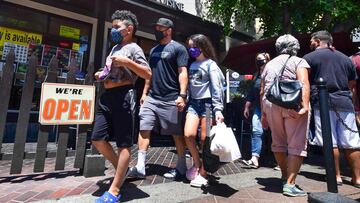Will unemployment payments restart due to the covid-19 Delta variant?
The extra unemployment benefits expire federally in September but with a new wave of covid-19 approaching unemployment could rise.


The Delta variant of covid-19 could threaten the US recovery from the pandemic, according to analysts. The highly transmissible strain, first identified in India, has become the dominant strain worldwide and is taking hold in the US.
Alongside the relaxing of restrictions, the rise in cases countrywide is being attributed to the strain.
Since the beginning of July, cases nationally have grown from 18,334 to 39,719, an increase of 117%. However, the rise in deaths and hospitalisations have not grown at the same pace due to the vaccine rollout. More than 49% of the country's population has been fully vaccinated as of publication.
What risks does the Delta variant pose?
Health
The World health Organisation (WHO) believes the Delta variant ot be twice as transmissible than the original strain of covid-19. Dr. F. Perry Wilson from Yale University says, "the average person infected with the original coronavirus strain will infect 2.5 other people. In the same environment, Delta would spread from one person to maybe 3.5 or 4 other people.”
Worried—We are now seeing lots of outdoor-only #DeltaVariant transmission between strangers with no direct contact. These sports attendees weren’t even sitting together—likely fleeting transmission at “pinch points” (bottlenecks) at stadium🏟 gates. This would change everything. https://t.co/tLnxb58N5P
— Eric Feigl-Ding (@DrEricDing) July 19, 2021
Indeed, the CDC anticipates the strain will be the dominant strain in the US soon. Currently it makes up 31.1% of cases, up from 20% from the end of June.
Those who get Delta covid-19 are 2.61 times more likely to end up in hospital compared to the original strain.
Economy
If infection rates continue to grow unabated in the US then there could be further risks to businesses, either by reduced footfall or by the resumption of restrictions, as they have in California.
Small restrictions like mask wearing have a negligible effect on the economy but restrictions on numbers of clients or customers would have a greater effect.
And with the number of vaccinated people growing the likelihood of more draconian measures is unlikely.
It is unlikely the country will see restrictions reintroduced to such an extent that unemployment will become as high as it was in January, when the American Rescue Plan was first floated. Federal Reserve Chairman Jerome Powell said the stated unemployment rate of 6.5% "grimly understated the decline in labour market conditions for the most economically vulnerable Americans," and said the number was closer to 10%.
If restrictions become as tough as back in 2020 then unemployment rates would grow and the clamour for further support for the unemployed would grow too. As the chances of these numbers getting that high again during the pandemic diminish with every vaccine, the chance of increased federal support also diminishes.
However, states with low vaccination levels are much more at risk and targeted support within states could be a viable alternative.
What does this mean for unemployment benefits?
There are currently no plans to extend the benefits past their scheduled end in September.
That is not to say they could not continue; the end date in under two months away but it has been seen in the pandemic multiple times how quickly situations can change. To go back to Los Angeles again, it only took one month of 'freedom' for masks to be made mandatory once more.
Further unemployment benefit news:
- What has Biden said about states restarting unemployment benefits?
- What states have ended federal unemployment benefits and are more people working?
- $300 Unemployment benefits: In which states have judges forced payments to continue?
- Have pandemic payments cuts been effective for people to get back to work?
Why are unemployment benefits ending in September?
Initially started under the American Rescue Plan, the scheme gives unemployed persons an extra $300 a week in support. They were always due to end on September 6 2021.
Related stories
Some 26 states cancelled the benefits early, arguing that they were withholding unemployed people from rejoining the workforce, although this claim is disputed.
And after they withdrew from the federal plan many encountered legal problems after residents challenged the states in court. Some states have agreed to resume payments until the federal end.

